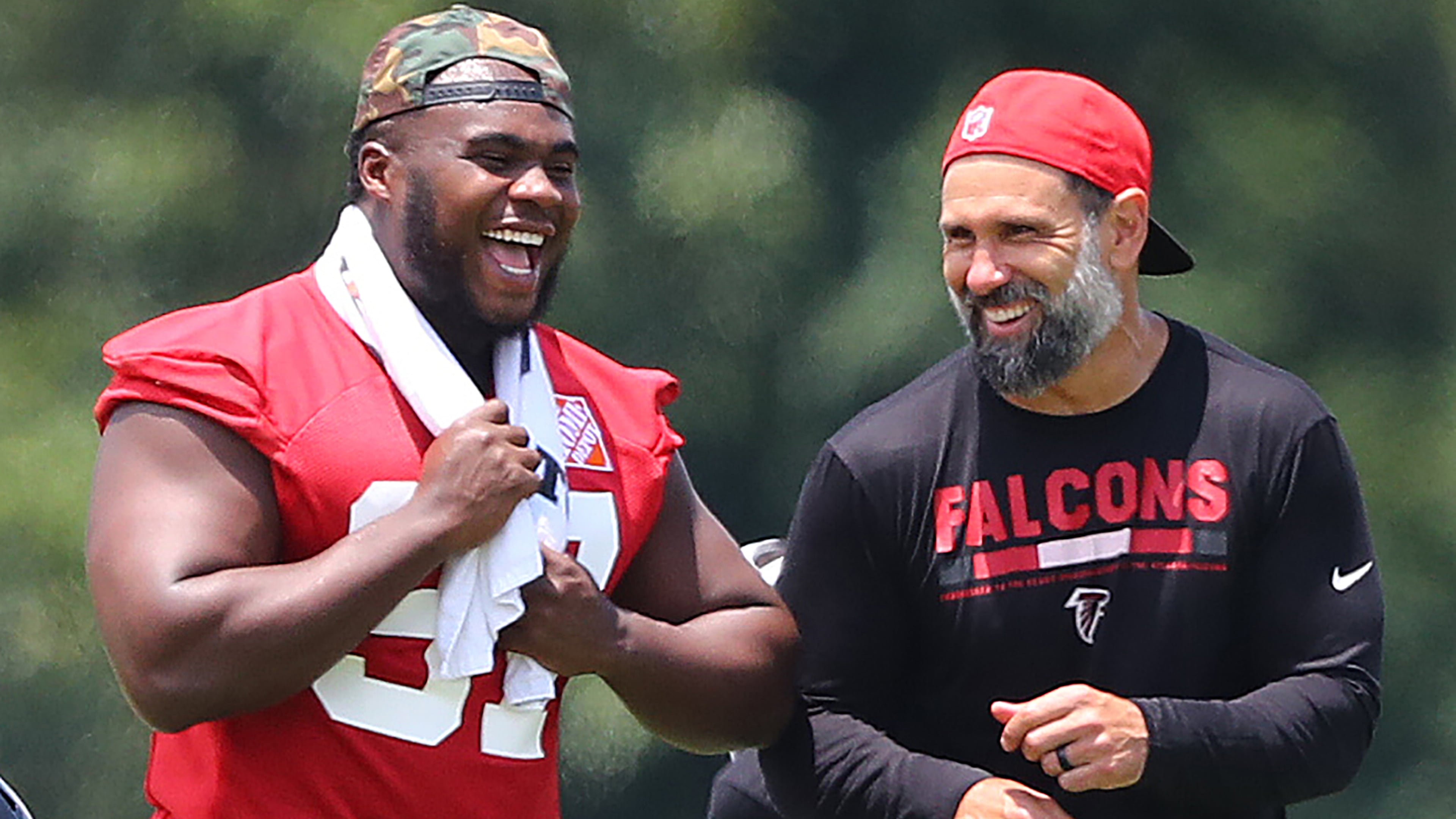Jones, Jarrett at Falcons camp with no contract complaints. That’s worth something.













Julio Jones and Grady Jarrett aren’t practicing during Falcons minicamp this week. Jones isn’t going to risk aggravating his feet, and coach Dan Quinn included Jarrett among those sidelined for “precautionary” reasons. Both players are there, though, for whatever that’s worth.
Maybe it’s not much beyond mentoring their younger teammates and allowing the Falcons to sidestep negative headlines. But it signals that Jones and Jarrett aren’t so unhappy about their contracts that they stayed away from the mandatory camp after (wisely) skipping voluntary workouts. That’s probably worth something for the Falcons, especially with Jones.
Last year he sat out minicamp and threatened to hold out of training camp before the Falcons gave him a bit more upfront money. This time Jones showed up for minicamp, even though he’s yet to get the new deal he’s been promised. Jones said that’s because he trusts that franchise owner Arthur Blank will pay up eventually.
“At the end of the day, his word is gold,” Jones told AJC Falcons beat writer D. Orlando Ledbetter. “He said they are going to get something done between them and my agency. As far as me, I just hold up my end and stay ready.”
Jarrett’s situation is a bit different. He signed the one-year, $15.2 million franchise tag that the Falcons extended to prevent him from becoming a free agent. The sides can agree to a contract extension before July 15.
If they don’t, and Jarrett doesn’t want to risk playing with the one-year deal, his only real recourse would be to hold out of training camp.
“(My representatives) are going to handle all of that,” Jarrett said. “I am here to talk about football and being back around my teammates. I missed my guys.”
The best-case scenario for the Falcons would be to have deals for Jones and Jarrett done already. It’s a consolation to have them present and not grumbling about their contracts. That leaves the Falcons relatively better off than other teams with key players sitting out this week.
Jadeveon Clowney isn’t at Texans minicamp after he was given a franchise tag. Kicker Robbie Gould is skipping San Francisco’s camp for the same reason. Jaguars defensive and Yannick Ngakoue stayed away from Jaguars minicamp because several comparable defensive ends got big-money extensions, and he didn’t.
That's how it goes in the NFL system, which gives teams pretty much all the leverage over players in contract negotiations. The only power that players have is to withhold their services, but that comes with the price of fines and public scorn. Some players are willing to pay it, and some aren't.
Teams that use their leverage risk damaging relationships with their players. Playing hardball can cause hard feelings. That might not matter so much for the backup safety, but it can for star players such as Jones and Jarrett.
Jones showed last year that, when it comes to business, even low-maintenance guys have their limits. Jones never makes a stir about his touches or touchdowns and doesn’t publicly pressure the front office to do right with his deals. But Jones was willing to sit out when push came to shove.
Jarrett might face the same decision soon. The Falcons said after the 2017 season that signing him to an extension was a priority. They didn’t get it done, though some of that had to do with Jarrett’s camp waiting to see how defensive tackle Aaron Donald’s pending contract would affect the market. The eventual cost to the Rams for Donald was a $40 million signing bonus, with $86.9 million guaranteed.
Last month Falcons general manager Thomas Dimitroff said he's "confident that something will get done" with Jarrett. But the GM added: "If it doesn't, we have a year to continue to talk about it." Dimitroff said he was confident about a new deal before the Falcons used the franchise tag on Jarrett, who may not have the same perspective about that one-year timeline.
Jarrett is among six NFL players who got franchise tags this offseason. Jarrett, Clowney and Gould don’t have new deals. Defensive ends DeMarcus Lawrence, Dee Ford and Frank Clark all got extensions one way or another.
The Cowboys used the $20.6 million franchise tag on Lawrence. A month later the sides agreed to a contract extension that includes $25 million upfront and $65 million in total guarantees.
Ford was tagged by the Chiefs. A month later they traded him to the 49ers, who agreed to a five-year deal with Ford that includes an $8 million signing bonus and $33.4 million guaranteed.
The Seahawks used their tag on Clark. Seven weeks later they traded him to the Chiefs, who worked out a five-year contract with Clark that included $43.8 million upfront and $62.3 million in total guarantees.
Jarrett, 26, is among the better young defensive linemen in the NFL. He hasn’t been paid like it during his five-year career ($632,000 average salary) because he was a fifth-round pick out of Clemson. Jarrett’s $15.2 million salary for 2019 is a huge raise, but a one-year deal provides little security.
Jarrett showed up for Falcons minicamp, anyway. Jones did the same despite his unresolved contract situation. That’s worth something for the Falcons.

